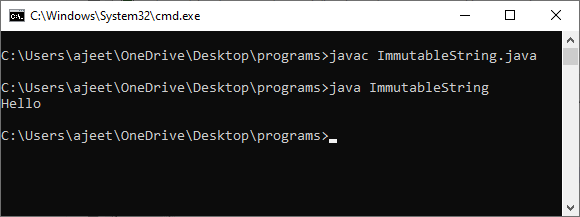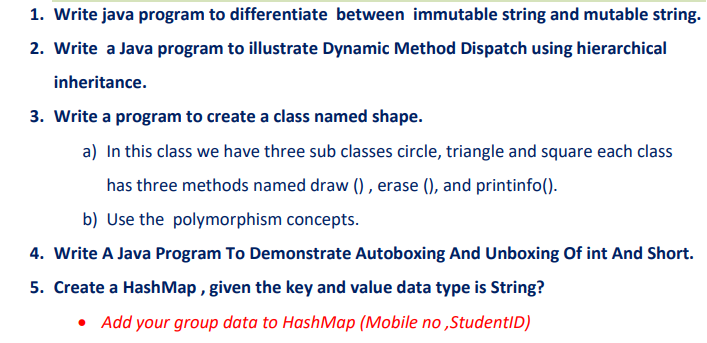Why Are Strings Immutable in Java? Insights right into Memory Performance
Why Are Strings Immutable in Java? Insights right into Memory Performance
Blog Article
What Is Immutable Strings and Just How It Functions
In the realm of programming, comprehending the principle of immutable strings is vital for producing durable and safe and secure applications. Unalterable strings refer to strings that can not be modified after they are developed, making certain data stability and predictability within the code.
The Essentials of Unalterable Strings
Immutable strings, as an essential idea in programming, are personality series that can not be altered once they are developed. This suggests that when a string is appointed a worth, that worth can not be modified. In languages like Python and Java, strings are immutable items, bring about various implications in terms of memory management and information honesty.
Among the essential benefits of unalterable strings is that they provide a sense of safety in data manipulation. Since the content of an unalterable string can not be customized, it ensures that the original information stays undamaged, decreasing the threat of unintentional changes throughout program execution (Why are strings immutable in Java?). This home likewise simplifies debugging processes, as designers can rely on that once a string is specified, its value will not be inadvertently changed
Moreover, immutable strings promote reliable memory use. When a brand-new string is created based on an existing one, instead of modifying the original string, the brand-new worth is kept separately. This approach improves performance by decreasing memory fragmentation and simplifying memory allowance processes. In general, recognizing the essentials of unalterable strings is critical for mastering programs concepts and maximizing code efficiency.
Advantages of Unalterable Strings
Structure upon the protection and effectiveness benefits of immutable strings, their benefits include enhancing code integrity and simplifying concurrent shows tasks. By being unalterable, strings can not be modified after creation, which removes the risk of unintended changes in the data they save. This inherent immutability makes certain that once a string is developed, its value remains consistent throughout the program's execution, reducing the chances of pests triggered by unexpected modifications.
Furthermore, immutable strings add to code reliability by making it less complicated to reason regarding the state of a program. Because strings can not be changed, designers can trust that a string will certainly constantly hold the exact same worth, simplifying debugging and upkeep efforts. This predictability results in more secure and reputable codebases.

Implementation in Programs Languages
Within various shows languages, the unification of unalterable strings is a fundamental aspect that influences how information is managed and manipulated within code frameworks. The execution of unalterable strings varies across various programs languages, with each language providing its very own mechanisms to support this idea.

On the other hand, languages like C and C++ do not have integrated assistance for immutable strings. Programmers in these languages must manually execute immutability by enforcing policies within their code to prevent direct adjustments to string objects.
Best Practices for Collaborating With Immutable Strings
When taking care of immutable strings in shows languages like Java and Python, sticking to finest techniques ensures protected and effective data manipulation. One of the essential ideal techniques is to utilize StringBuilder or StringBuffer rather of straight manipulating strings, specifically when dealing with substantial concatenation procedures. These courses provide mutable choices for string control, assisting to prevent unneeded memory allocations and improving efficiency.
Additionally, when functioning with sensitive information such as passwords or API secrets, it is vital to prevent storing them as plain text in immutable strings. Making use of protected storage systems like char varieties or specialized collections for managing delicate information aids alleviate safety threats connected with immutable strings.
Real-world Applications and Instances
Exploring functional applications of immutable strings in different markets exposes their significant effect on information honesty and system integrity. In the healthcare sector, unalterable strings play a crucial function in guaranteeing the protection and confidentiality of patient information. By protecting against unauthorized modifications to sensitive info such as clinical documents and prescriptions, unalterable strings aid maintain conformity with rigorous personal privacy laws like HIPAA.
Financial establishments likewise take advantage of the unalterable nature of strings to improve the protection of customer data and deal documents. Immutable strings aid avoid fraud and unapproved alterations to monetary information, providing a robust protection versus look at more info cyber risks and making sure the trust fund and self-confidence of clients.

Verdict
Finally, immutable strings are repaired and stable sequences of characters that use advantages such as thread safety and enhanced efficiency in programming. They are executed in various shows languages to make certain information honesty and protection. Finest methods for collaborating with immutable strings consist of preventing straight modifications and making use of approaches that return new string items. Real-world applications of unalterable strings consist of information encryption, caching, and string manipulation jobs.
Immutable strings refer to strings that can not be changed after they are developed, making sure information honesty and predictability within the code. When a new string is developed based on an existing one, rather than changing the initial string, the brand-new worth is kept individually.In languages like Java and Python, strings are immutable by default, meaning that once a string object is created, its value can not be changed - Why are strings immutable in Java?. Finest techniques for working with immutable strings consist of preventing straight adjustments and making use of approaches that return new string objects. Real-world applications of unalterable strings consist of data encryption, caching, and official site string control jobs
Report this page